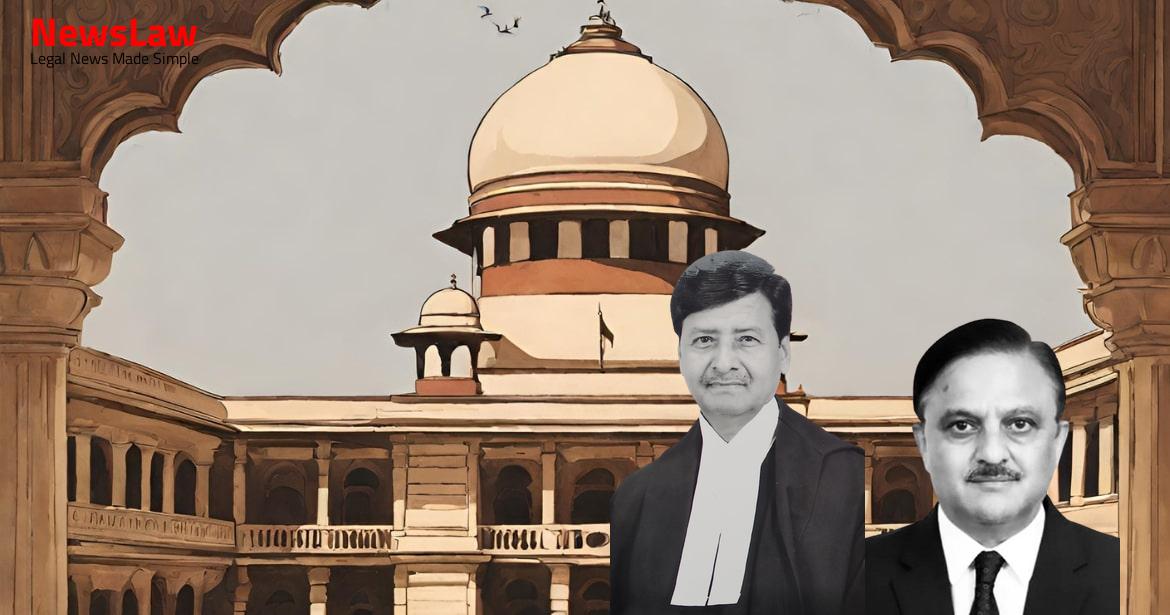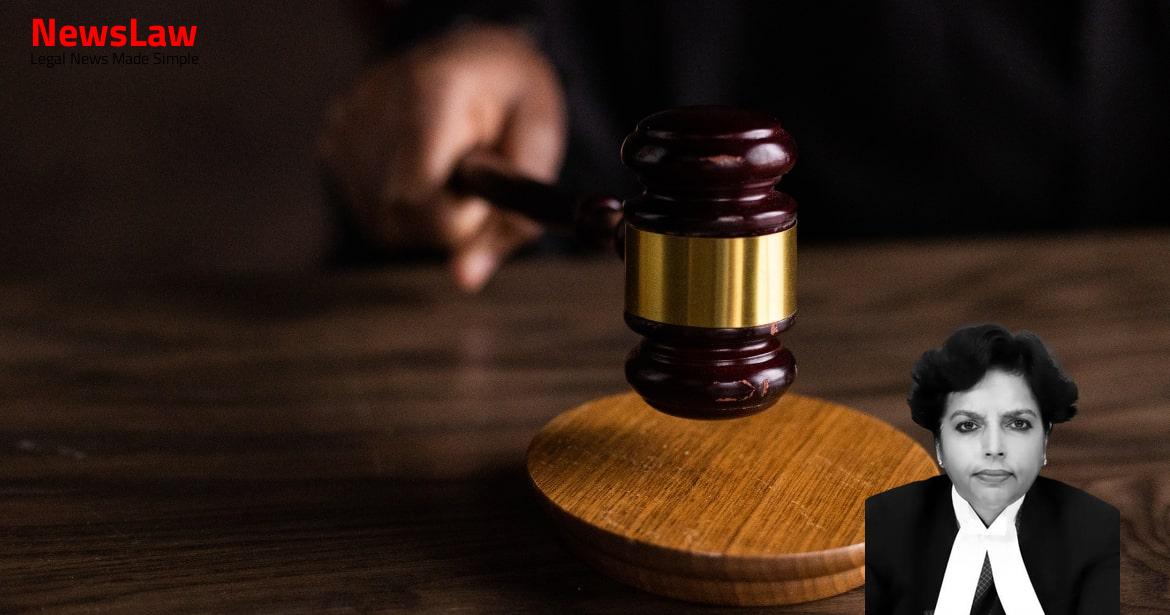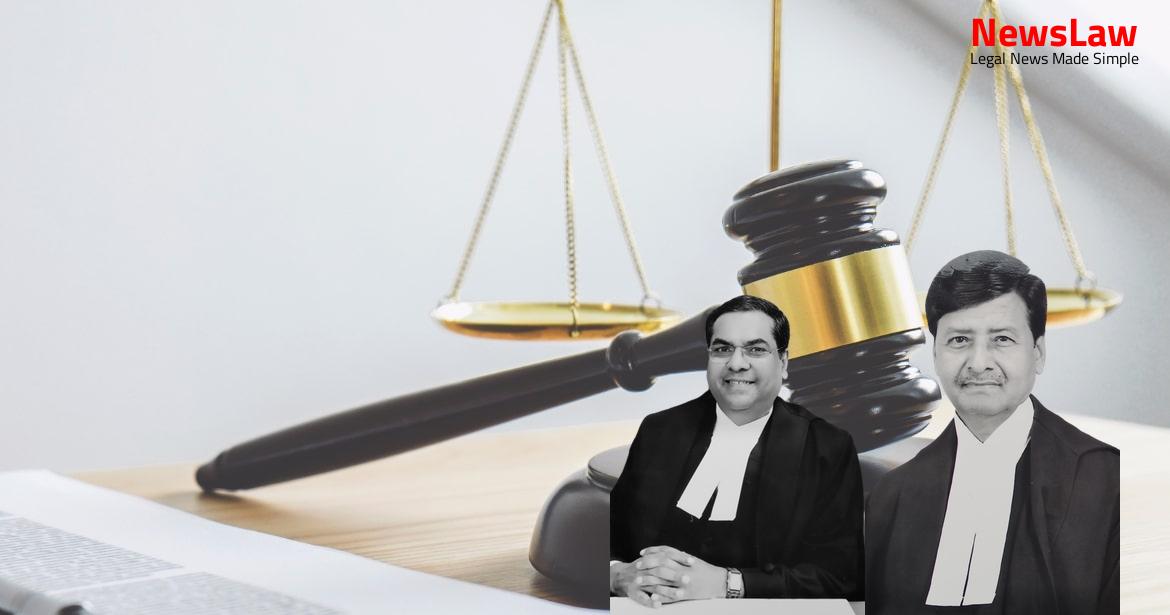Explore a compelling legal analysis focusing on the contentious issue of industry status and compensation in a recent court case. The court’s thorough examination of the matter provides valuable insights into the complexities of the legal framework governing such disputes. Stay tuned to understand the nuances of the court’s reasoning and the implications of its decision.
Facts
- The appellant imposed a penalty of compulsory retirement on the respondent through an office order dated 16 September 2004.
- The respondent challenged the penalty by filing a writ petition.
- An inquiry report found the respondent guilty of various misconducts.
- A charge sheet was served upon the respondent for assaulting the Assistant Director on 27 December 2003.
- The application made by the appellant for approval of imposing the penalty was dismissed on 8 December 2004.
- The appellant filed a petition challenging the charge sheet and later sought a review petition which was rejected.
- A division bench of the High Court delivered a judgment on 30 November 2009, which the appellant took an exception to.
- The appellant also applied for a clarification of the judgment which was rejected.
- The situation escalated with the appellant objecting to a circular issued in 2002 regarding compensatory leave options.
- Respondent filed Writ Petition No 10211/2005 challenging the Office Order imposing the penalty of compulsory retirement.
- Industrial Tribunal disposed of the reference made by respondent based on appellant’s statement regarding workmen’s duty on specified days.
- Single Judge of Delhi High Court allowed the Writ Petition and directed appellant to reinstate respondent with back wages.
- Appellant filed an appeal against the Single Judge’s decision.
Also Read: Recovery of Misappropriated Temple Funds: Court’s Legal Analysis
Issue
- The first question to be answered is whether the appellant can be allowed to raise a contention that it is not an Industry within the meaning of I.D. Act.
Also Read: Determining Seniority in Delayed Appointments: Legal Analysis
Arguments
- The learned senior counsel for the appellant argued that the appellant is not a profit-making entity and depends on government grants and donations.
- The appellant had deposited the entire amount of back wages as ordered by the court, which was withdrawn by the respondent.
- The counsel emphasized that any amount ordered to be paid to the respondent would be at the cost of public interest and lead to unjust enrichment.
- The appellant is not considered an industry and the reinstatement order was justified as per the decisions cited.
- The order of compulsory retirement without approval under Section 33 of the I.D. Act means the respondent is deemed to have continued in employment.
- The burden of proving not being gainfully employed after compulsory retirement lies on the respondent.
- The counsel argued that the order of payment of back wages cannot be mechanically passed without considering the circumstances.
- The respondent’s misconduct, including assaulting a senior official, was highlighted as a reason against reinstatement by the respondent’s counsel.
- The appellant’s counsel stated that the appellant’s status as an industry under the I.D. Act was a key question in the appeal.
- It was noted that the appellant did not pursue fresh proceedings against the respondent to test the industry status.
- The respondent’s failure to prove lack of gainful employment disentitles him to claim back wages.
- The issue of charitable or philanthropic nature of the appellant was discussed, as well as reliance on government grants and donations for activities.
- The appeal’s counsel suggested reasonable compensation in lieu of reinstatement due to loss of confidence and potential encouragement of indiscipline.
- The appellant’s withdrawal of an application for approval under Section 33 of the I.D. Act was mentioned, despite the respondent objecting.
- The respondent withdrew the amount deposited by the appellant in 2010, which was highlighted as a relevant factor in the case.
- The appellant never proved that the respondent was gainfully employed.
- The counsel for the respondent argued against interference with the impugned Judgment and Order.
Also Read: Legal Analysis in Assault and Homicide Case
Analysis
- The appellant applied for withdrawal of the application citing lack of requirement for prior approval for compulsory retirement.
- The respondent has not worked with the appellant since the order of compulsory retirement in 2004.
- An application for prior approval was made before the Industrial Tribunal as per Section 33 of the I.D. Act.
- The contention that the appellant is not an industry was not considered due to multiple reasons.
- Serious misconduct was found against the respondent, which was not disturbed by the High Court on merits.
- A finding of prima facie misconduct with a significant time gap was noted.
- The issue regarding the nature of the appellant as an industry remains open for future cases.
- A review application raised the management’s nature as a registered society conserving relics of Gandhiji.
- The High Court did not disbelieve the alleged acts of misconduct.
- The employer was justified in not continuing the respondent’s employment due to loss of confidence.
- Compensation was granted without reinstatement due to the nature of the misconduct.
- No inquiry was conducted in the case before this Court where compensation was granted.
- The question of whether the appellant is an industry is not solely a legal matter.
- The compulsory retirement order was set aside due to lack of obtaining required approval.
- The charge of assaulting an Assistant Director was proved against the respondent.
- Reinstatement was not deemed in the interest of justice considering the nature of misconduct.
- The appellant’s object to propagate Gandhi’s philosophy was noted throughout the case.
- An industrial dispute on compensatory leave was raised by the respondent previously.
- A long gap of 17 years and nature of activities were considered in not granting reinstatement.
- The High Court overlooked relevant factors while making its decision.
- In the case of Talwara Cooperative Credit and Service Society Ltd., it was held that the burden is on the employee to prove they were not gainfully employed after dismissal.
- The burden of proof on whether the employee was gainfully employed is on the employee as per Section 106 of the Indian Evidence Act, 1872.
- The burden of proof being discharged or not is based on the facts of each case and needs to be evaluated based on the material on record.
- In the present case, the respondent did not make any claim or provide any evidence that they were not gainfully employed during the relevant period.
- The back wages up to June 2010 were deposited in the Court, indicating no plea of unemployment by the respondent.
- Reference was made to the decision in Indian Railway Construction Co. Ltd. for further clarification.
- Appellant receives financial support from a corpus fund of Rs.50 million provided by the Government of India.
- The corpus fund’s interest is utilized for the management of the respondent Museum.
- Income is generated through the sale of books, literature, donations, and contributions from the public and other institutions.
- The purpose and activities of the society, including the propagation of the thoughts of the Father of the Nation, are considered in determining compensation.
- The appellant has used the funds for noble activities over the years.
Decision
- Compensation of Rs. 6,50,000/- to Rs. 7,00,000/- in lieu of reinstatement deemed just and proper.
- Appellant directed to pay Rs. 2,50,000/- to respondent within six weeks.
- After considering previous sum received, total payable amount by appellant is Rs. 2,50,000/-.
- Order of reinstatement and back wages set aside.
- Appellant to pay total compensation of Rs. 6,50,000/- to respondent.
- Interest of 12% p.a. applicable if payment not made within six weeks.
Case Title: NATIONAL GANDHI MUSEUM Vs. SUDHIR SHARMA (2021 INSC 538)
Case Number: C.A. No.-008215-008216 / 2011



